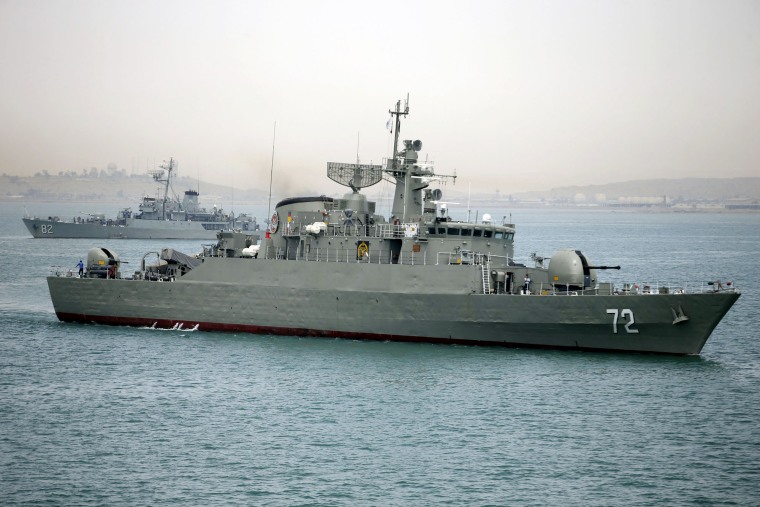After an American show of force off the coast of Yemen, a convoy of Iranian military cargo ships yesterday turned back from a suspected mission to resupply Houthi rebels who ousted the Yemeni president last month. Meanwhile, in Vienna, American and Iranian diplomats gathered in a historic palace-turned-hotel for the latest round of negotiations aimed at constraining Iran’s nuclear program.
"This week’s developments underscore the fundamental dilemma for the Obama administration in dealing with Iran."'
The reversal of the Iranian ships in the Gulf of Aden marks a rare American success in pushing back against Iran’s increasingly assertive efforts to extend its influence across the Middle East. However, the episode foreshadows the complex strategic challenge facing the Obama administration – namely, how to handle an increasingly dangerous proxy war between Iran and Washington’s chief regional allies, especially Saudi Arabia, while advancing the final, intense push to achieve a nuclear deal with Iran before a June 30 deadline.
The conflict in Yemen has metastasized at a particularly complicated moment. Following years of instability and intermittent civil war, the Houthi takeover of Yemen presented Riyadh with the prospect of Shi’a, Iranian-backed governments on both its northern and southern borders. For the Saudis, who have mostly been at odds with Tehran since its 1979 revolution, this was unthinkable. As a result, the Saudis launched a massive air campaign last month against the Houthis, with rhetorical and operational support from Washington including the deployment of the USS Theodore Roosevelt aircraft carrier and other American warships off the Yemeni coast.
RELATED: Obama warns Iran on aiding Yemeni rebels
This week’s developments underscore the fundamental dilemma for the Obama administration in dealing with Iran: solving one aspect of the problem – even one as potentially menacing as an Iranian nuclear weapons capability would be – will not offer any immediate remedy to the myriad other threats posed by Iran’s foreign and domestic policies.
A nuclear deal won’t alter the fundamental drivers of Iran’s efforts to extend its influence across the Middle East and it won’t sever Tehran’s relationships with the violent, often destabilizing proxy groups it supports and directs in Yemen, Iraq, Syria and beyond. Nor, for that matter, would a nuclear deal have much immediate positive effect on the Iranian government’s treatment of its own people or its handling of judicial cases against Iranian-Americans, several of whom are currently held in Iranian prisons on trumped up charges.
If anything, a nuclear deal might well exacerbate all the other concerns about Iran’s behavior in the region and at home. Iranian hard-liners, who view any compromise with the United States as a capitulation, will be eager to reinforce their reach, especially on the battlefield. A comprehensive deal will end the severe multilateral sanctions regime that has been erected over the course of the past five years, slowly returning as much as one hundred billion dollars in frozen assets to Tehran and reopening the spigots of international trade and investment.
To be clear, Iran’s regional policies have never been primarily resource-driven; in fact, its most destabilizing policies have persisted and even worsened during times of economic pressure. Still, the prospect of the regime’s exorbitant windfall after a nuclear deal will surely not help in constraining its support for Syria’s murderous leader Bashar al-Assad or its tendency for troublemaking in other contested arenas in the Arab world.
And most of all, a nuclear deal would decisively conclude Iran’s pariah status for most of the world. If the nuclear negotiations succeed, the Islamic Republic will be back in business, its standing as an investment destination restored and its place in the community of nations effectively normalized.
This restoration is, of course, precisely what Tehran is seeking and precisely what its adversaries in the region – all of whom are close American allies – are determined to prevent. They appreciate that once the current network of multilateral sanctions is unraveled, it will almost surely never be reinstated, absent some extraordinary Iranian provocation. European countries have never proven willing to jeopardize their trade ties with Tehran over its regional subversion or terrorist activities, and they will be even more loathe to do so after a nuclear deal opens the floodgates of new business.
"If anything, a nuclear deal might well exacerbate all the other concerns about Iran’s behavior in the region and at home."'
This is why the nuclear negotiations elicit such strenuous opposition from Iran’s neighbors. Beyond their rhetorical protests, the Saudis and other Arab states will continue to look for opportunities to contest Iran’s bid for regional influence. This in turn will draw in Washington, despite the Obama administration’s concerted efforts to avoid direct entanglements in Middle Eastern wars.
President Obama has invested enormous effort in resolving the Iranian nuclear crisis, in hopes that a deal could help calm the region’s propensity for chaos. It will not – at least not in the foreseeable future. This week’s gambit worked: a modest bit of American muscle-flexing shook off Iran’s latest initiative in Yemen. However, it will be an exceptionally short-term gain if it is not complemented by a much more robust, forward-looking approach to the seething sectarian violence that threatens to devour Yemen, as well as Syria, Libya and potentially much of the rest of the Middle East.
Suzanne Maloney is a Senior Fellow at the Saban Center for Middle East Policy at the Brookings Institution.
